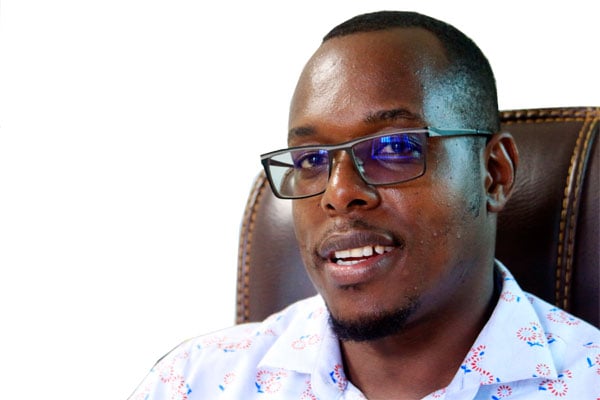Prime
A beautiful mind: Coping with mental health issues

Mr Musinguzi Begumisa. Photos/Morgan Mbabazi
What you need to know:
- Musinguzi Begumisa overcame bipolar disorder to thrive as an engineer at Uganda National Roads Authority.
As a young man growing up a few blocks away from Butabika Hospital, Musinguzi Begumisa had no idea that he would end up being a patient at Uganda’s solitary mental health referral hospital.
The second of Jackson and Margret Begumisa’s three children, Musinguzi—who was born on June 22, 1984—shares his torturous journey with bipolar disorder in an autobiographical account titled “In search of sanity: How my bipolar disorder turned into a blessing.”
Aged 11, Musinguzi knew that things had gone awry but had no idea that what he was experiencing was a mini-depression. Poverty and turmoil in his secure and stable family triggered his illness.
Despite being a successful businessman—or in fact because of it—Musinguzi’s father adopted a polygamous lifestyle that weighed heavily on his mother.
Musinguzi says their lives changed in a flash when their father discovered a new business idea—coffee.
“He decided to leave my mother in Kampala to go to Ishaka to start a new life—a life with another woman and a series of others,” Musinguzi said, adding his father bought coffee for export or delivery to the Coffee Marketing Board in Bugolobi, Kampala.
Brilliant pupil
Musinguzi’s mother accepted to take on the baggage of being a co-wife—and playing second fiddle to the co-wife in Ishaka—because she wanted her children to get an education. Musinguzi proved to be a brilliant pupil in school. He was disheartened after scoring Aggregate Five when he wrote his Primary Leaving Exams at St Kizito Primary School Bugolobi in Kampala.
He went to St Mary’s College Kisubi for O and A-Levels. He topped the country in the Uganda Certificate of Education (UCE) results in 2001. While in A-Level, Musinguzi began to score low grades. With hindsight, he attributes this to what was going on internally in his system thanks to external pressures coming from home and school. It barely helped that his father was in a financial stress at that time.
“…I remember how traumatic it was to hear my name read as a school fees defaulter in front of the whole class and being shown the exit. It was very demeaning for me…,” Musinguzi writes in his memoirs, adding, “My dad came over to the school on several occasions and pleaded with the Brother to let me continue studying as he brought the money in instalments. This tension led to inward stress that I was not aware was building up slowly by slowly…”
Musinguzi wasn’t the only one tail spinning. A broken relationship with her husband was taking a toll on Musinguzi’s mother.
First breakdown
Musinguzi recalls that his first breakdown was in mid-2015 while studying at Makerere University. He says it was sparked off when his mother packed her bags and went back to her parents’ home in Kyamutaasa, Kyenjojo District in western Uganda.
“…I remember that day as if it was yesterday. Holding tightly on the iron bars of Lumumba Hall gate near Gongom, that cultural symbol of the hall, and weeping. Weeping uncontrollably. I didn’t care who saw me. I was in pain.”
Musinguzi says, all of a sudden, he lost interest in almost everything. He lost appetite and with it his body weight. His aunties quickly organised a psychiatric check-up and he was taken to a psychiatrist, Dr Margaret Mungherera at the Midland Consultation Clinic in Mengo.
“I was to be a regular patron here until my doctor’s passing to the other world,” he says.
Dr Mungherera, who died of cancer in 2017, prescribed medication to help him cope with his new life. One of his uncles travelled to Kyamutaasa and persuaded his mum to return to her marital home.
Musinguzi immediately returned to Makerere University. He says he was not sure if going to school was a good idea. He ran away from the engineering school because he failed to take exams. His brilliant mind was suddenly shutting down. The lectures became a drag.
Because of the heavy sedation, he felt sleepy all the time. Sleep, he writes, “became my number one enemy yet, as we shall see later, part of the recovery techniques involves having a well-rested mind. What an oxymoron! Oh, I can remember how I felt. So lost and lonely…”
He recalls one moment when he “went to the hall and didn’t leave the room for about a week.” When Joseph, his friend, checked on him, “he was appalled at the state in which I was”—absent-minded, smelly. He had even attempted to take his life by swallowing 40 tablets in one go.
Joseph rushed Musinguzi to Dr Mungherera’s clinic. She was angry that he had gone back to school. She prescribed medication and insisted that he was not ready to return to the brutal life in academia.
Second breakdown
During his second breakdown, Musinguzi took a boda boda to State House Nakasero in Kampala. After alighting the boda, he told the military officers that he wanted “to see President Museveni” and fill him in on “a strategy to save the economy.”
Within minutes, he was in handcuffs and tossed to the ground. The boda boda rider who attempted to flee for his dear life was arrested and also roughed up.
Musinguzi ended up at the Central Police Station. He was only freed when his uncle—Chriso—got a letter from Dr Mungherera detailing his psychiatric disorder.
Musinguzi says he had slipped into a manic episode, which has a way of bringing out brilliant ideas. Grand ideas that the victim believes can change mankind.
He was immediately driven in an ambulance to Butabika Hospital where he spent a month. Musinguzi fled from the hospital by squeezing himself through a hole in the fence. He eventually ended up at his brother’s home in Luzira. He was later taken back to the mental asylum.

After the passage of time, Dr Mungherera declared that he was ready to return to school. Saddled with retakes, the heavy medication often left him sleepy. He also battled being overweight.
Meeting his wife
Musinguzi also worried that women would reject him on account of his psychiatric disorder. After four rejections, he eventually met his future wife—Grace—in 2008. The couple walked down the aisle on December 3, 2011. Over time, his wife and three daughters would provide a great support system.
Musinguzi is a professional engineer based in Kampala. He works as a materials specialist at the Uganda National Roads Authority (UNRA). His career spans over 12 years in various capacities in the engineering industry. He is currently the team lead at Praus Group, which offers solutions to civil engineering problems.
During the Mental Health Day on October 10, it was revealed that 10 percent of Uganda’s 42 million population has suffered from some form of mental illness.
According to health experts, only about one percent of the Gross Domestic Product (GDP) is devoted to mental health. Studies have shown that the country is losing at least Shs907 billion annually in productivity due to mental disorders.
‘Not doing enough’
According to Dr Hasfa Lukwata, the acting assistant commissioner for mental health and control of substance abuse at the Ministry of Health, “mental health investment” leaves a lot to be desired.
Parliament enacted the law on mental health in 2019. President Museveni assented to the Mental Health Act, 2019, on December 25, 2018. The legislation makes provision for the care of persons of unsound mind and the management of mental hospitals in Uganda. Its key objectives are to ensure the safety and protection of persons with mental illness, the protection of their rights, and the safety of the people who come into contact with them.
“It will fix many critical issues within the mental circles, especially restoring respect, human dignity and privacy for the patients, but also ensure their safety … [while] provid[ing] the much-needed access to care and medical treatment,” Musinguzi says of the law, adding that “implementation and monitoring by the Uganda Mental Health Advisory Board” is key.
On his part, Jimmy Odoki Acellam— the coordinator of Heartsounds Uganda—says the law empowers “people with mental health challenges” insofar as treatment is concerned. Previously, treatment was sought without “their consent.” Mr Acellam, however, regrets to note that “implementation [of the law] hasn’t started.”
“The status quo will remain the same. Without enough sensitisation many [people with psychiatric disorders] will continue being stigmatised and marginalised,” Musinguzi told this publication.
About mental disorders
According to the World Health Organisation (WHO), there are many mental disorders that present differently. They are generally characterised by a combination of abnormal thoughts, perceptions, emotions, behaviour and relationships with others. Mental disorders include depression, bipolar disorder, schizophrenia and other psychoses, dementia, and developmental disorders, including autism.
There are effective strategies for preventing mental disorders such as depression. There are effective treatments for mental disorders and ways to alleviate the suffering caused by them. Access to healthcare and social services capable of providing treatment and social support is key, WHO adds.
According to Dr Harriet Birabwa, a senior consultant psychiatrist at Butabika Hospital, mental illnesses are informed by settings.
“In general hospitals, depression, anxiety disorders, adjustment disorders and mental disorders due to general medical conditions, including delirium are likely to be common,” she said, adding, “In mental health units, bipolar disorders, alcohol and substance-related disorders, schizophrenia, depression and other conditions such as HIV-related mental illnesses are more common. Epilepsy, though not strictly a psychiatric condition, is a common cause of re-attendance in mental health outpatient units.”
According to WHO, bipolar disorder affects about 45 million people worldwide. “Bipolar disorders are characterised by manic or hypomanic symptoms with or without depressive episodes. Predominant disturbance is in the mood, but illness also affects activity, cognition (thinking) and behaviour. The disturbance is different from normal mood changes and disturbs usual functioning in relationships, work and other areas,” Dr Birabwa told this publication.
Bipolar disorder tends to be chronic, episodic and recurrent with normal functioning in between episodes, Dr Birabwa notes. She adds that causes are multifactorial, including biological factors (neurochemical imbalances and genetics) as well as other childhood psychological, social and environmental stress factors. Treatment tends to be long-term.





